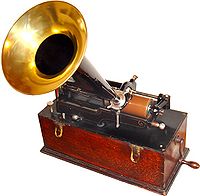In the Mid 1800’s , following the American Civil war, educational institutions in the North were created for newly Emancipated Slaves. One of these Historical Black Colleges, Fisk University, created an ensemble of nine students, that were formally slaves, to perform concerts and tours ignorer to financially assist the school. By the late nineteenth and twentieth century the Jubilee quartets became popular and multiple Historically Black Colleges organized quartets to help support their mission. Following this Jubilee quartet groups were singing for the community, barbershop, and even in Song battles.
Jubilee quartets were a cappella vocal groups that performed for the entertainment of others. This differs from Folk music that was not used for entertainment but simply to express feelings and communication. Compared to the lack of records for Folk music and negro spirituals, these songs were recorded. In 1891, Columbia record, one of the top record labels today, recorded the “first” African American group, the Standard Negro Quartette of Chicago, on a cylinder. This new technology for the use of music made it easier to record and keep track of African American music compared to before. The Hampton Institute, John Work III , and Fisk University were among those Blacks who recorded records using cylinders. Compared to the objection of secular and African American music in the past, whites saw dollar signs next to jubilee music and its artists. In the 1920’s, jubilee quartets were taken commercial and labeled “race music”. The nation’s total wealth more than doubled between 1920 and 1929.  You would expect these jubilee artists to benefit from this and earn profits right? Well white people still made more money off of Blacks talents then Black people made off of their own. In the 1930’s radio broadcasts were in and cylinders were out! Radio’s were in any and everyone’s households no matter your face or income, you had a radio. This led to jubilee music, “race music”, also being broadcasted and black programming to attract black communities. But if you ask me I think everyone had a secret liking for Jubilee music. I mean how could you not respect such talent, making instrumental sounds with your mouth.
You would expect these jubilee artists to benefit from this and earn profits right? Well white people still made more money off of Blacks talents then Black people made off of their own. In the 1930’s radio broadcasts were in and cylinders were out! Radio’s were in any and everyone’s households no matter your face or income, you had a radio. This led to jubilee music, “race music”, also being broadcasted and black programming to attract black communities. But if you ask me I think everyone had a secret liking for Jubilee music. I mean how could you not respect such talent, making instrumental sounds with your mouth.
The style of music contained repetition and elements from traditional folk spiritual, simple harmonic’s, and incorporated call and response. Usually the group sings the chorus in harmony, then a soloists reports the ease, while the group harmonizes and sings rhythmic phrases. The use of voices to make instrumental sounds sets Jubilee quartets apart. There were three kinds of Jubilee quartets: The community-based quartet, the barbershop quartet, and the college and university quartets. Among popular Barbershop quartets were *Drum Roll please* The Mills Brothers. They would gather in front of their father’s barbershop to sing and play the kazoo to those walking by. They first started dominating instruments after Harry discovered he had lost his kazoo. He began cupping his hands to his mouth and imitated a trumpet. The success of his imitation led to all the brothers taking on instruments to imitate and created their early signature sound. John Jr. accompanied the four-part harmony first with a guitar. They practiced imitating orchestras they heard on the radio. John, as the bass, would imitate the tuba. Harry, a baritone, imitated the trumpet, Herbert became the second trumpet and Donald the trombone. They eventually performed for radio stations and were even signed. TIMES WERE CHANGING GUYS! Among their popular songs were:
- I aint got nobody
- Sing as you swing
- Daddy’s little girlAnd many more songs that eventually appeared in films.
As Jubilee quartets became less popular in the 1950’s R&B became popular. However Jubilee would be essential to the creation of what we know now as Gospel music. While before Jubilee, Folk and Negro spirituals, all contained music and messages that alluded to the Bible and were spiritual, today Gospel is one of the only Black genres used to talk about religion. Over the years HBCU’s have continued to sing traditional jubilee songs. Fisk university, the first to start jubilee quartets, has remained intact with their musical history as the Fisk Univeristy Jubilee singers are still active. Having newer generations sing traditional songs show the impact music can have on many generations. It also allows newer generations to see the evolution of music and understand the history of music in the African American community and HBCU’s. Fisk Universities Jubilee Singers have continued to show the greatness of the music by being nominated for a grammy in their collaboration with Jonny Lang in “I believe”. It is disappointing that the talents of jubilee quartets and the style of music is only recognized when a whiter face is in front singing the Gospel, Blues, and Rock that we created. Furthermore, it is interesting to see more women participate in jubilee quartets. While their were some women quartets , this was limited do to women stance in America at the time.
[embedyt] https://www.youtube.com/watch?v=Li1dtJ6jC4w[/embedyt]
[embedyt] https://www.youtube.com/watch?v=GUvBGZnL9rE[/embedyt]
[embedyt] https://www.youtube.com/watch?v=WVJICPDsIY0[/embedyt]

